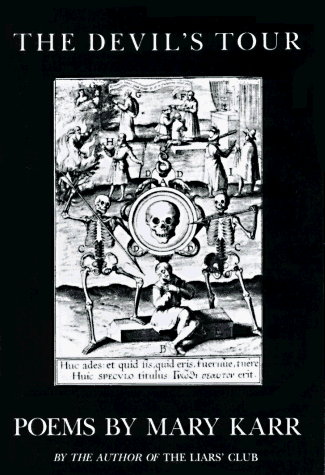
Synopsis
Book by Karr, Mary
"synopsis" may belong to another edition of this title.
Reviews
Karr's ( Abacus ) collection encompasses traditional subjects and forms: elegies for friends, homages to mentors, love poems, fantasies inspired by the arts (Don Giovanni or an early Renaissance etching), confessions, poems about children and friends and the passing of parents. The technique is controlled, not ostentatious, and one senses here a conscious link to the work of older poets such as Larkin and Levertov. Karr's strength lies in her delicate and meticulous control of detail. Characteristically, she describes a cat's nighttime prowl with humor and precision: " . . . he pounced and rabbit-kicked my head. / I had to disentangle from my hair / all four sets of claws, then tossed him / out into the pyramid of boxes / we'd erected in the yard." Such loving attention to seemingly insignificant events is reminiscent of the early work of Adrienne Rich and the use of imagery is similarly evocative ("When the moon / clicked over the sun like a black lens / over a white eye. . . "). Karr's work generally falls into clipped stanzas, the lines flowing over for an effect of ironic tension appropriate for much of the "devilish" material with which she is concerned. While the poet's unflinching consciousness stands out in this text, the poetic voice is not completely developed.
Copyright 1993 Reed Business Information, Inc.
Evil is the theme of this second book by Karr ( Abacus, LJ 9/15/87), and these dark poems are movingly adept. Her material is challenging. "Coleman," the first and best poem, is about a fatal run-in between a small-town gang and the black Southern teenager whom the narrator loves. Not only can Karr handle this kind of subject matter without sentimentality; she is also accomplished at natural-sounding formal meter: "When he stands to cough the syrup from his lungs,/ arrive to sponge him cool, and he cries no/ and no and no, the only syllable" ("Croup"). Occasionally, Karr moves beyond the tight confessional lyric at which she excels to the third-person narrative: in "Don Giovanni's Confessor," for example, the appalled sinner confesses to his priest, who is then thrust into his own horrific recollection. While the jacket blurb claims that Karr writes "for everyday readers," these are complex, intellectual poems. They demand and withstand many readings, and for that one can be grateful. Recommended.
- Ellen Kaufman, Dewey Ballantine Law Lib., New York
Copyright 1993 Reed Business Information, Inc.
"About this title" may belong to another edition of this title.
Search results for The Devil's Tour
The Devil's Tour
Seller: Your Online Bookstore, Houston, TX, U.S.A.
paperback. Condition: Good. Seller Inventory # 0811212319-3-35375915
The Devil's Tour
Seller: Wonder Book, Frederick, MD, U.S.A.
Condition: Good. Good condition. A copy that has been read but remains intact. May contain markings such as bookplates, stamps, limited notes and highlighting, or a few light stains. Seller Inventory # X07C-01339
The Devil's Tour
Seller: Wonder Book, Frederick, MD, U.S.A.
Condition: Very Good. Very Good condition. A copy that may have a few cosmetic defects. May also contain light spine creasing or a few markings such as an owner's name, short gifter's inscription or light stamp. Seller Inventory # Y10A-03892
The Devil's Tour
Seller: HPB-Diamond, Dallas, TX, U.S.A.
Paperback. Condition: Very Good. Connecting readers with great books since 1972! Used books may not include companion materials, and may have some shelf wear or limited writing. We ship orders daily and Customer Service is our top priority! Seller Inventory # S_446364238
The Devil's Tour
Seller: ThriftBooks-Phoenix, Phoenix, AZ, U.S.A.
Paperback. Condition: Good. No Jacket. Pages can have notes/highlighting. Spine may show signs of wear. ~ ThriftBooks: Read More, Spend Less. Seller Inventory # G0811212319I3N00
The Devil's Tour
Seller: ThriftBooks-Dallas, Dallas, TX, U.S.A.
Paperback. Condition: Fair. No Jacket. Readable copy. Pages may have considerable notes/highlighting. ~ ThriftBooks: Read More, Spend Less. Seller Inventory # G0811212319I5N00
The Devil's Tour
Seller: ThriftBooks-Atlanta, AUSTELL, GA, U.S.A.
Paperback. Condition: Good. No Jacket. Pages can have notes/highlighting. Spine may show signs of wear. ~ ThriftBooks: Read More, Spend Less. Seller Inventory # G0811212319I3N00
The Devil's Tour
Seller: ThriftBooks-Dallas, Dallas, TX, U.S.A.
Paperback. Condition: As New. No Jacket. Pages are clean and are not marred by notes or folds of any kind. ~ ThriftBooks: Read More, Spend Less. Seller Inventory # G0811212319I2N00
The Devil's Tour
Seller: ThriftBooks-Reno, Reno, NV, U.S.A.
Paperback. Condition: Very Good. No Jacket. May have limited writing in cover pages. Pages are unmarked. ~ ThriftBooks: Read More, Spend Less. Seller Inventory # G0811212319I4N00
The Devil's Tour
Seller: ThriftBooks-Dallas, Dallas, TX, U.S.A.
Paperback. Condition: Very Good. No Jacket. Former library book; May have limited writing in cover pages. Pages are unmarked. ~ ThriftBooks: Read More, Spend Less. Seller Inventory # G0811212319I4N10
